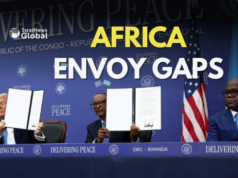Afghanistan’s Taliban regime has taken a leaf from India’s Pakistan playbook: supreme leader Hibatullah Akhundzada has ordered the construction of dams on the Kunar River “as fast as possible”.
The intention is clear: to reduce or restrict the flow of water into Pakistan’s Khyber Pakhtunkhwa province where it is used for irrigation and drinking water supply. In the long term, such restrictions could also impact the flow of the Indus and affect farming in Punjab province.
The order from the Taliban supremo comes within days of armed clashes with Pakistan that have taken hundreds of lives and saw Kabul being bombed.
It also comes in the wake of the first ever visit by a Taliban leader to India last week. Acting Foreign Minister Amir Khan Muttaqi had extensive discussions with his Indian counterpart Dr S Jaishankar and the joint statement issued provides food for thought:
“Both sides underscored the need for sustainable water management and agreed to cooperate on hydroelectric projects with a view to addressing Afghanistan’s energy needs and supporting its agricultural development.”
India’s former ambassador to Afghanistan Jayant Prasad, in an interview to StratNewsGlobal, put it in simple and stark terms:
“For India to take out an insurance policy by engaging the Taliban is a good thing because we have to ensure that the current regime continues to adhere to the principle that it will not allow its territory to be used … against India because we have a security problem created by terrorist groups,” he said.
Prasad was India’s envoy in Kabul when the Indian Embassy came under terrorist attack twice in 2008 and in 2009 that led to the death of senior diplomats. India and Afghanistan, then under President Hamid Karzai, held Pakistan’s Inter-Services Intelligence (ISI) responsible for orchestrating the attacks in coordination with the Taliban.
That is in the past and not forgotten as India still does not recognise the Taliban regime. But it has upgraded what was operating in diplomatic parlance as a “technical mission” in Kabul to a full fledged embassy, albeit with a CdA (Charge de Affaires) holding charge, not an ambassador.
Prasad believes India must move quickly to restart the four consulates that India had in Afghanistan, in Kandahar, Herat, Jalalabad and Mazar-e-Sharif.
India had shut down its Embassy in Kabul on 15 August, 2021 when the Taliban entered the capital. The embassy staff along with then envoy Rudrendra Tandon was evacuated to Delhi by a special air force flight on 17 August 2021.
There was the justifiable concern that the Taliban posed a security threat to the embassy. There was also the fact that the Haqqani network, which carried out the twin attacks on the Indian embassy, is part of the Taliban.
“I think our diplomats will have to be careful. They have been careful in the past, but now they’ll have to be particularly careful. I don’t think in the changed circumstances, Siraj Haqqani and his group of fighters will create a particular problem for us. Our equations have changed,” said Prasad, adding that Pakistan continues to have influence in Afghanistan.
He said this is because the Afghan Taliban is also “divided” and that there are groups within Afghanistan who can “act at Pakistan’s behest and pose a threat to India.”




